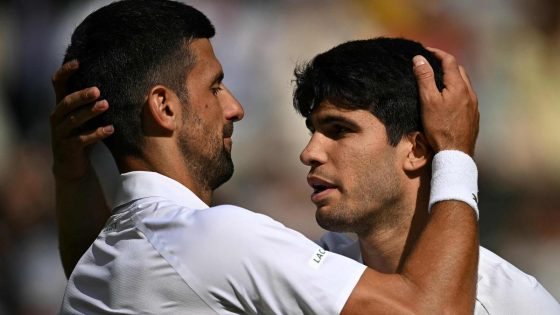The ageless legend against the young superstar. The controversial Serb against the diplomatic Spaniard. The epitome of technical perfection against the most dynamic athlete in tennis history.
How fitting that on the 150th anniversary of modern tennis — which began on grass in Victorian England — the sport’s undisputed GOAT faced a worthy successor. As Novak Djokovic said during the fortnight, “History is on the line.”
Tickets on the black market for the hugely anticipated showdown sold for as much as $17,000.
With 24 Grand Slam titles, Djokovic yearned to break his tie with Margaret Court as the all-time leader. Last year at age 36, he astonished the sports world by coming within one match of winning a rare Grand Slam when Carlos Alcaraz dethroned him in a riveting five-set Wimbledon final.
This year, advanced age, injuries, and even a rare lack of motivation left Djokovic out of sorts and seemingly over the hill. Stunningly, he hadn’t won a tournament or even reached a final. On June 5, he underwent surgery to repair a torn meniscus suffered at the French Open and wasn’t sure he’d enter Wimbledon until four days before the start of the revered tournament he’d captured seven times.
“I didn’t come here to play a few rounds and prove to myself and others that I can actually compete in one or two matches,” Djokovic declared. “I really want to go for the title.”
That he did, thanks in part to an easy draw and a fourth-round walkover from the injured, No. 9 seed Alex DeMinaur. But The Djoker steadily regained his elite form and outclassed No. 15 Holger Rune 6-3, 6-4, 6-2 in the fourth round. Then he polished off No. 25 Lorenzo Musetti 6-4, 7-6, 6-4 to make his 10th Wimbledon and record 37th Grand Slam final, in what Nick Kyrgios called “an incredible performance.” Former No. 1 Jim Courier said, “It’s miraculous he’s here in the final.”
When some in the Centre Court crowd booed him for celebrating the semifinal victory by mimicking playing the violin, a loving gesture to his adorable, six-year-old daughter Tara, Djokovic took the high road and recalled his less serene, life-changing youth.
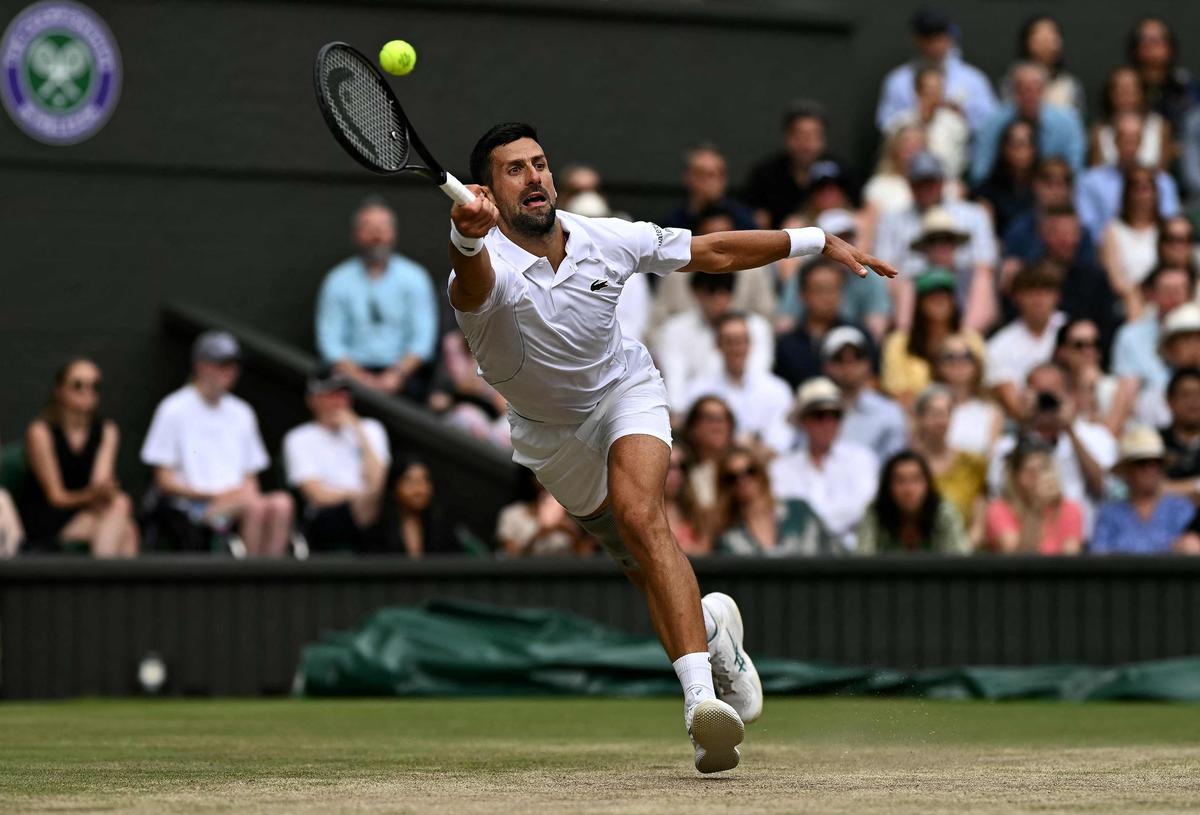
“I didn’t come here to play a few rounds and prove to myself and others that I can actually compete in one or two matches,” Djokovic declared. “I really want to go for the title.”
| Photo Credit:
AFP
“I didn’t come here to play a few rounds and prove to myself and others that I can actually compete in one or two matches,” Djokovic declared. “I really want to go for the title.”
| Photo Credit:
AFP
“Wimbledon has always been a childhood dream for me — to play it, to win it. I’ve told the story many times, but I think it’s worth repeating it. I was a seven-year-old boy in Serbia watching the bombs fly over my head and dreaming of being on the most important court in the world, which is here — Centre Court at Wimbledon — while constructing a Wimbledon trophy out of any material I had in the room…watching myself in the mirror and telling myself I’d be a Wimbledon champion one day.”
His dream did come true, far longer and more glorious than he could ever have imagined.
But was it over? Now that he achieved sports immortality was he a mere mortal on the tennis court?
When Jannik Sinner routed him at the Australian Open in January, Djokovic insisted the setback was “not necessarily the beginning of the end” of his reign. But Alcaraz, the better half of the new Big Two, missed the season’s first major with an injury. Now the clash of the tennis titans for the most coveted trophy in tennis would either put Novak back on top — at Wimbledon if not in the rankings — or confirm what Patrick McEnroe and other pundits predicted.
Djokovic revealed he underestimated Alcaraz a year ago. That would not be the case on Championship Sunday. Carlos, who became the first teenager to rank No. 1, had gone 3-0 in major finals and became the youngest man (21) to capture major titles on all three surfaces. Although this tournament was just his fifth on grass, his unique combination of awesome power and delicate touch, his blazing foot speed, vast array of shots, improvisational skills, and shrewd tactics made him a natural on this tricky surface.
Further, he was better than ever in several areas. With a streamlined serving stance and motion, Alcaraz increased his first serve speed average from 118 mph to 123 going into this final. The Spaniard’s mental control became a key to his 6-7, 6-3, 6-4, 6-4 semifinal victory over No. 5 Daniil Medvedev: “Yesterday I was calmer than last year. For example, I tried not to think about the match or just for a few moments watching some videos. But apart from that, I try not to think about it.”
Critical games
Although Alcaraz overwhelmed Djokovic for most of the lopsided 6-2, 6-2, 7-6 (4) final, three compelling games stood out. The marathon opening game lasted 13 minutes as Djokovic fought off four break points before missing a forehand on the fifth. Alcaraz, more confident and relaxed than a year ago when he nervously dropped the first set, 6-1, tested — even tormented — Djokovic with almost every shot in his diverse arsenal. The Serb eventually failed the test. Renowned for turning defense into offense ever since winning his first Slam at the 2008 Australian Open, Novak often found himself arriving late and swinging late for Carlos’ explosive shots that sounded more like firecrackers.
Early in the third set, some spectators chanted “Let’s go Nole” (his nickname) to try to get him into the match. Though the majority rooted for the popular Alcaraz, Djokovic was now the underdog, and they wanted the competitive match they had expected.
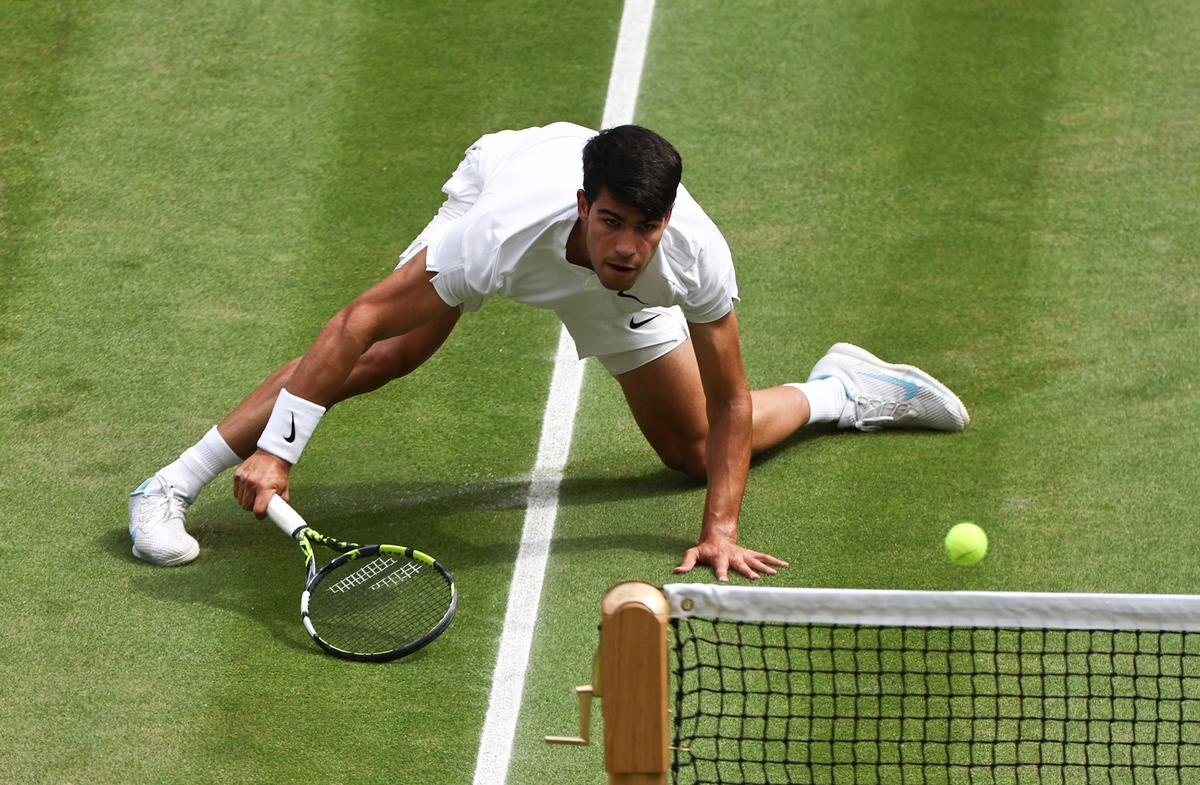
No nerves this time: Alcaraz, more confident and relaxed than a year ago when he nervously dropped the first set, 6-1, tested — even tormented — Djokovic with almost every shot in his diverse arsenal.
| Photo Credit:
Getty Images
No nerves this time: Alcaraz, more confident and relaxed than a year ago when he nervously dropped the first set, 6-1, tested — even tormented — Djokovic with almost every shot in his diverse arsenal.
| Photo Credit:
Getty Images
With Alcaraz serving at 2-3, Djokovic somehow matched the power and speed of his younger rival, earning two break points that Alcaraz squelched. Order was finally restored when the Spaniard held serve with a 121-mph ace. “Djokovic played a great game, but he still didn’t win it,” said ESPN’s John McEnroe, a three-time Wimbledon champion in the 1980s.
The ninth game turned into a Federeresque highlight reel for Alcaraz, who modelled his game after the Swiss maestro. Two rocket forehands put Djokovic in a love-30 hole. On the next “Did you see that!” point, Carlos leaped laterally to intercept a backhand volley before it landed, converting what normally would have been a passing shot attempt into a spectacular swinging forehand crosscourt volley winner. Two points later, Alcaraz sprinted to unleash a backhand passing shot winner for the service break. “It’s a shot-making smorgasbord,” raved Patrick McEnroe.
Responding to the cheering fans during the changeover, Djokovic smiled. But with Alcaraz serving for the title, it was no laughter matter for the Serb. Alcaraz reeled off the next three points, giving him triple championship point.
Shockingly, Carlos the Closer morphed into Carlos the Choker. He lost five straight points! The lowlights: a double fault, a wild swinging volley error, and two forehand errors.
Before the final, Alcaraz had said, “I’m not new anymore…. I’ve been in this position before.” Indeed, a year ago he memorably pounded 18 winners (to Djokovic’s 3) in the final set.
Experience breeds confidence and poise, and Carlos held serve at love to force a tiebreaker. Djokovic had won 25 of his last 28 tiebreakers at majors, but the irresistible force that is Alcaraz could not be stopped in this critical tiebreaker. With the Midas touch, he conjured an incredible half volley winner to go ahead 4-3 and then massaged a disguised drop shot winner for 6-4. The relaxed Spaniard smiled. On championship point, Djokovic, the best serve returner in history, hit a backhand return in the net.
Always gracious in defeat, Djokovic embraced Alcaraz at the net. King Carlos raised his arms and blew kisses to the Centre Court spectators before hustling to his player’s box to rejoice with his family, friends, and team.
“The mental strength [Alcaraz showed] after he blew the 40-love lead is one of the reasons we love this guy,” said John McEnroe. “Many players would have folded, freaked out, but he kept his composure.”
In great company: Alcaraz became just the sixth man in the Open Era to capture the ‘Channel Double’ — Roland Garros and Wimbledon — in the same year. The others were tennis legends Rod Laver, Bjorn Borg, Nadal, Federer, and Djokovic.
| Photo Credit:
REUTERS
In great company: Alcaraz became just the sixth man in the Open Era to capture the ‘Channel Double’ — Roland Garros and Wimbledon — in the same year. The others were tennis legends Rod Laver, Bjorn Borg, Nadal, Federer, and Djokovic.
| Photo Credit:
REUTERS
“The changing of the guard becomes official today.” – ESPN analyst Patrick McEnroe had correctly predicted before the Wimbledon final.
Alcaraz became just the sixth man in the Open Era to capture the ‘Channel Double’ — Roland Garros and Wimbledon — in the same year. The others were tennis legends Rod Laver, Bjorn Borg, Nadal, Federer, and Djokovic.
But Alcaraz modestly rejected any comparisons to them, saying, “It is an amazing feeling for me being the champion here in Wimbledon back to back. I’m really proud and really happy. I am just building my path and my career. Obviously, I consider champions to be the big guys who have won 14, 15, 20 Grand Slams. Those guys who are eating at the big table. I want to be there one day. I have four Grand Slams, with two Wimbledons. It is a great achievement, I am not going to lie. I have to realise the things that I am doing. But I want to keep going. I want to keep building a good journey. And hopefully one day I can stay close to these champions and eat at the big table.”
He credited Djokovic, the sport’s GOAT, for his extraordinary success just 38 days after knee surgery. “I’m still believing that Novak is Superman because what he has done this tournament with a surgery just a few weeks before the tournament began. It is amazing,” Alcaraz said. “It is unbelievable. It’s something that is out of this world for me. I beat him today, but for me, Novak is still like a Superman.”
Krejcikova Czech-Mates Paolini in Suspenseful Wimbledon Final
No one predicted two longshots would make the women’s Wimbledon final — not even themselves.
Jasmine Paolini, the Cinderella story at the French Open but dismissed here with 50-1 odds, had never won a main draw match on Wimbledon grass. “Two Grand Slam finals in a row was crazy to believe, I think, no?” admitted the little Italian with a big heart after outlasting Donna Vekic in a 2-6, 6-4, 7-6 semifinal thriller.
Barbora Krejcikova, disrespected at 100-1 despite being the 2021 Roland Garros champion, had an unimpressive 13-11 career record on grass and an abysmal 7-9 match record going into Wimbledon, attributable to illness, a back injury, and rust. Yet the low-key Czech re-ignited her singles career — she amassed seven doubles and three mixed doubles Slam titles — at the world’s most prestigious tennis tournament.
Known for her savvy tactics, the resourceful Krejcikova defused powerful Elena Rybakina 3-6, 6-3, 6-4 and exclaimed in surprise, “I’m in the finals. Wow!” After recovering from a mid-match collapse to vanquish Paolini 6-2, 2-6, 6-4, the jubilant champion exulted, “Nobody believes that I got to the final. And I think nobody’s going to believe that I won Wimbledon. I still cannot believe it. It’s unbelievable.”
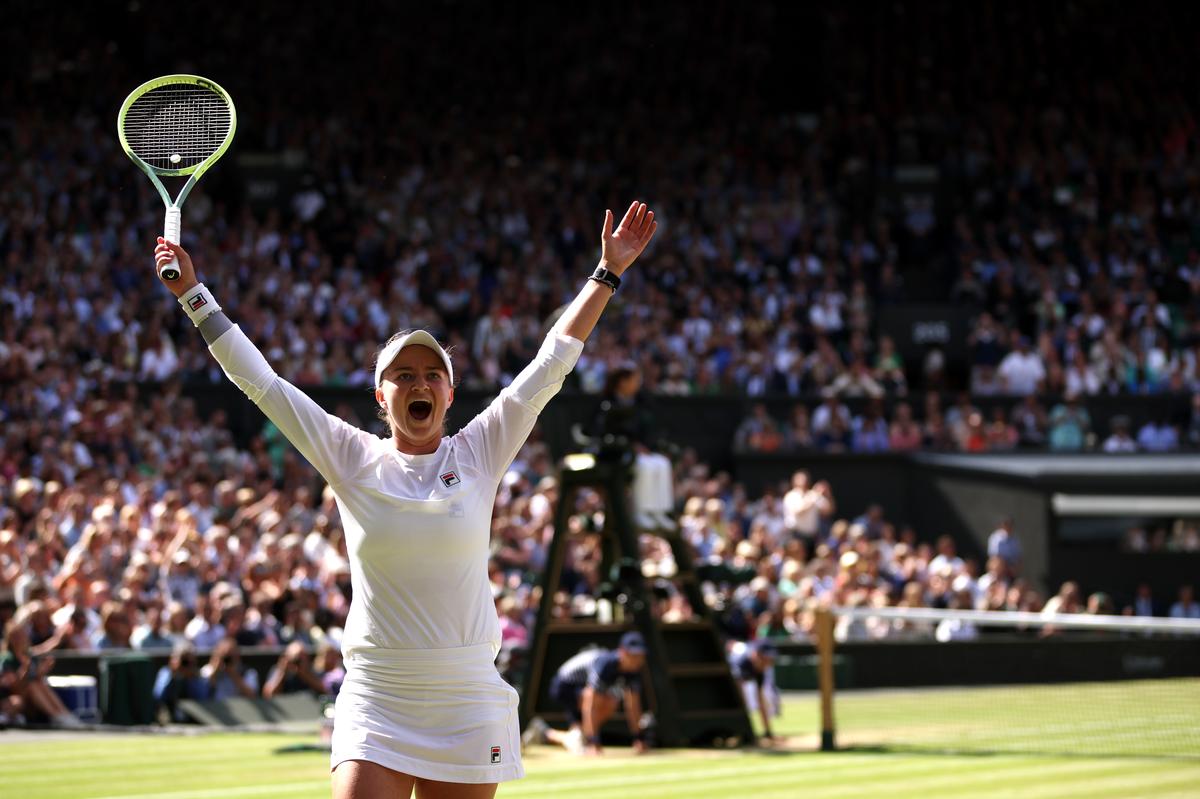
One for country: Barbora Krejcikova’s 6-2, 2-6, 6-4 triumph over Jasmine Paolini made Krejcikova the fourth woman from the Czech Republic to capture Wimbledon in the Open Era
| Photo Credit:
Getty Images
One for country: Barbora Krejcikova’s 6-2, 2-6, 6-4 triumph over Jasmine Paolini made Krejcikova the fourth woman from the Czech Republic to capture Wimbledon in the Open Era
| Photo Credit:
Getty Images
Perhaps we should have expected the unexpected. In the post-Serena Williams era, parity on the WTA Tour has prevailed most often at Wimbledon, where Barbora became the eighth lady to lift the trophy since Serena captured her eighth crown in 2016. Further, shockers have now become the norm. Rybakina, at 80-1 odds, won in 2022 and Marketa Vondrousova, at 100-1, triumphed a year ago.
In this improbable final, Paolini benefited from the ‘recency factor’. Her breakthrough year featured reaching the Australian Open fourth round and winning her first 1000 title at Dubai on hard courts before making her maiden Grand Slam final at Paris on clay. Jasmine sustained that momentum at Wimbledon where her bold shot-making and exuberance made her a crowd favorite. IBM Match Insights weighed both factors heavily, installing her as a 69 per cent favorite against Barbora.
Krejcikova, who ranked a career-high No. 2 in 2022, carried a chip on her proud shoulder. Following her victory over Madison Keys in the 2023 Miami Open third round, Krejcikova told WTA Insider, “When I read something on social media, it’s about Iga, Aryna, and Elena — I’m not really there. What else should I do? How should I prove it again? This week, again I’m here and I’m going to prove it again so that I get into this Top 3. I want to be mentioned as well. I want to be recognised as well because I think I deserve it. I’ve had a lot of success on the tour, and I just don’t get the credit.”
What Krejcikova lacked in charisma and acclaim, the 28-year-old Czech more than made up for in ‘crunch time’ brilliance, capturing 11 of her previous 12 major finals (all but one in doubles). That reservoir of confidence and experience would prove the difference in this fluctuating final.
“Who plays more fearlessly from the center of the court is key,” said ESPN analyst Brad Gilbert, who predicted Krejcikova would “win 6-4 in the third set.” ESPN analyst Pam Shriver, a coach on Vekic’s team, said, “The net play today could be the most important factor here in many years.”
As it turned out, Gilbert was right, particularly in the deciding set when Krejcikova attacked 33 per cent of the time compared to only 17 per cent for Paolini. At the net for the entire match, the Italian had a slight edge, winning 12 of 16 points, compared to 11 of 16 for the Czech. But those net forays were too infrequent to turn the tide.
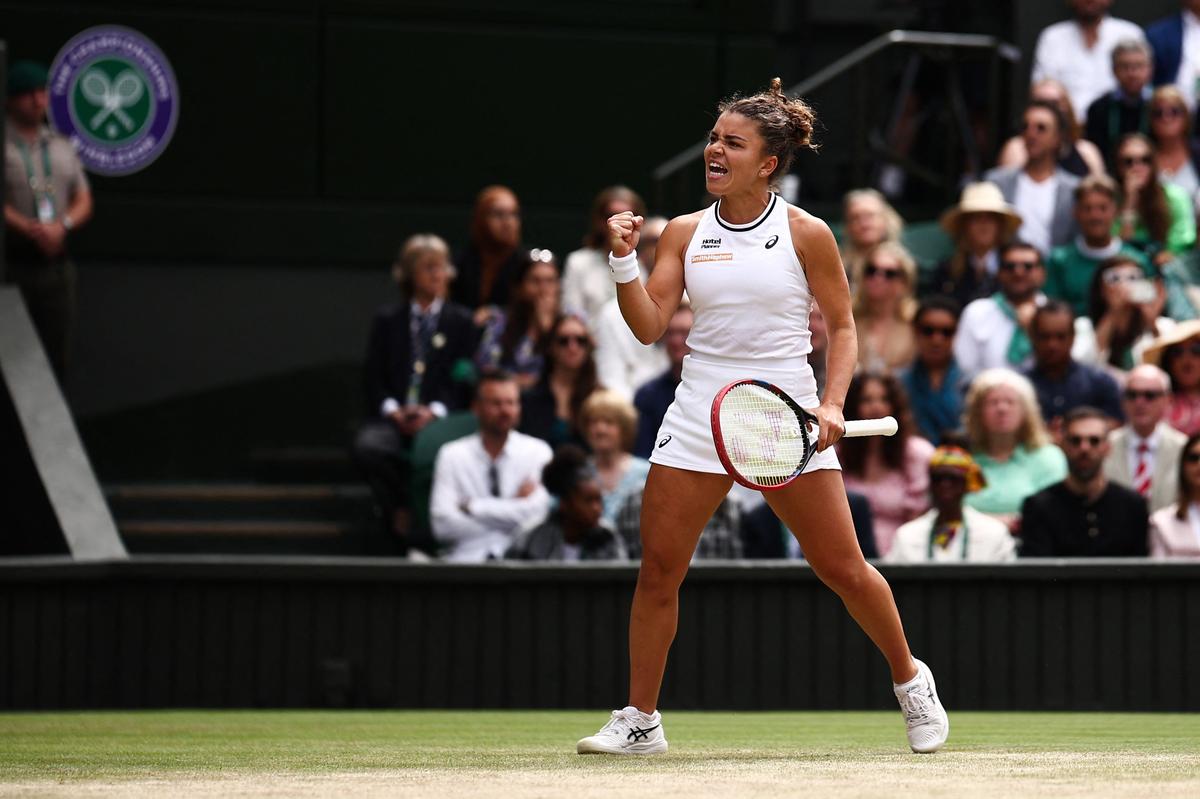
Surprise package no more: Jasmine Paolini, the Cinderella story at the French Open but dismissed here with 50-1 odds, had never won a main draw match on Wimbledon grass. “Two Grand Slam finals in a row was crazy to believe, I think, no?” admitted the little Italian with a big heart
| Photo Credit:
AFP
Surprise package no more: Jasmine Paolini, the Cinderella story at the French Open but dismissed here with 50-1 odds, had never won a main draw match on Wimbledon grass. “Two Grand Slam finals in a row was crazy to believe, I think, no?” admitted the little Italian with a big heart
| Photo Credit:
AFP
The 5’10” Krejcikova is a boxer-puncher who changes pace and spins to disrupt the rhythm of opponents, much like her compatriot Vondrousa did in her 2023 final upset over Ons Jabeur. But using her superior size and power — especially on the serve — against the 5’4” Paolini became the winning strategy. It also kept the highly partisan crowd mostly out of the match.
Krejcikova belted a crosscourt forehand winner on break point to set the tone in the opening game. The Czech secured her second service break for a 4-1 lead. When her forehand winner smacked the baseline to build it to 5-1, ESPN’s Chris Evert, who won her first Wimbledon 50 years ago, said, “She’s overpowering Paolini as Swiatek did in the French final. She’s in the zone.”
“Paolini needs to get the crowd involved,” advised Nick Kyrgios, a new ESPN analyst and 2022 Wimbledon runner-up, who engaged spectators for better or worse. Jasmine sensed that and shouted “Forza! Forza!” to pump herself up. Spectators responded with loud cheers.
Tactical sin
Strangely, in the second set, Krejcikova changed her winning game — a cardinal tactical sin. Playing defensively, she let Paolini back in the match. “Her forehand cross courts and serves were working in the first set, and then she stopped hitting with conviction,” pointed out ESPN analyst Mary Joe Fernandez.
Two timid Krejcikova backhand slice errors gave Paolini the break for a 2-0 lead. Energised, the Italian staved off a break point and held serve for 3-0, while the confused Czech gestured to her player’s box in frustration. In the eighth game, Krejcikova totally lost the plot with drop shot and weak forehand errors to lose her serve and the set, 6-2.
Early shock: Defending champion Marketa Vondrousova crashed out in the first round.
| Photo Credit:
REUTERS
Early shock: Defending champion Marketa Vondrousova crashed out in the first round.
| Photo Credit:
REUTERS
Paolini is a late bloomer at 28, much like compatriots Francesca Schiavone, the 2010 Roland Garros champion, and Flavia Pennetta, the 2015 US Open titlist. Her feisty demeanor, big semi-Western forehand, and undersized stature most resemble 5’3” Dominika Cibulka, the 2014 Australian Open runner-up. The shortest major champion in the Open Era was 5’3” Nancy Richey at the 1968 French Open. Since then, world-class tennis players have steadily increased in height, averaging around 5’9”, and have become more athletic.
In the deciding set, Krejcikova repeatedly exploited Paolini’s lack of height and reach with slice serves wide in the deuce court, kick serves in the ad court, and high-bouncing forehands. “She [Paolini] should have moved in on her serve returns to cut off the slice serve and kick bounce,” said ESPN analyst Rennae Stubbs.
The Czech easily held serve and earned a critical serve break for 4-3 when Paolini double faulted.
Krejcikova had reversed the momentum by playing aggressively. But could she keep her composure and conviction?
Serving for the championship at 5-4, Krejcikova fended off two break points — with a backhand volley winner and an inside-out forehand winner. Then she closed out the pressure-packed, 14-point game with two tough serves that overpowered Paolini’s vulnerable backhand. Asked by ESPN’s Fernandez to describe her mentality in the winner-take-all third set, Krejcikova answered, “Two words. Be brave.” Her 14 winners and four aces attest to that.
She still wasn’t clear, though, why her resurgence happened at Wimbledon, her least successful major until now. “I have no idea why this tournament. I had a really tough draw from the very first match. I was just going match by match. I was just feeling better and getting better.”
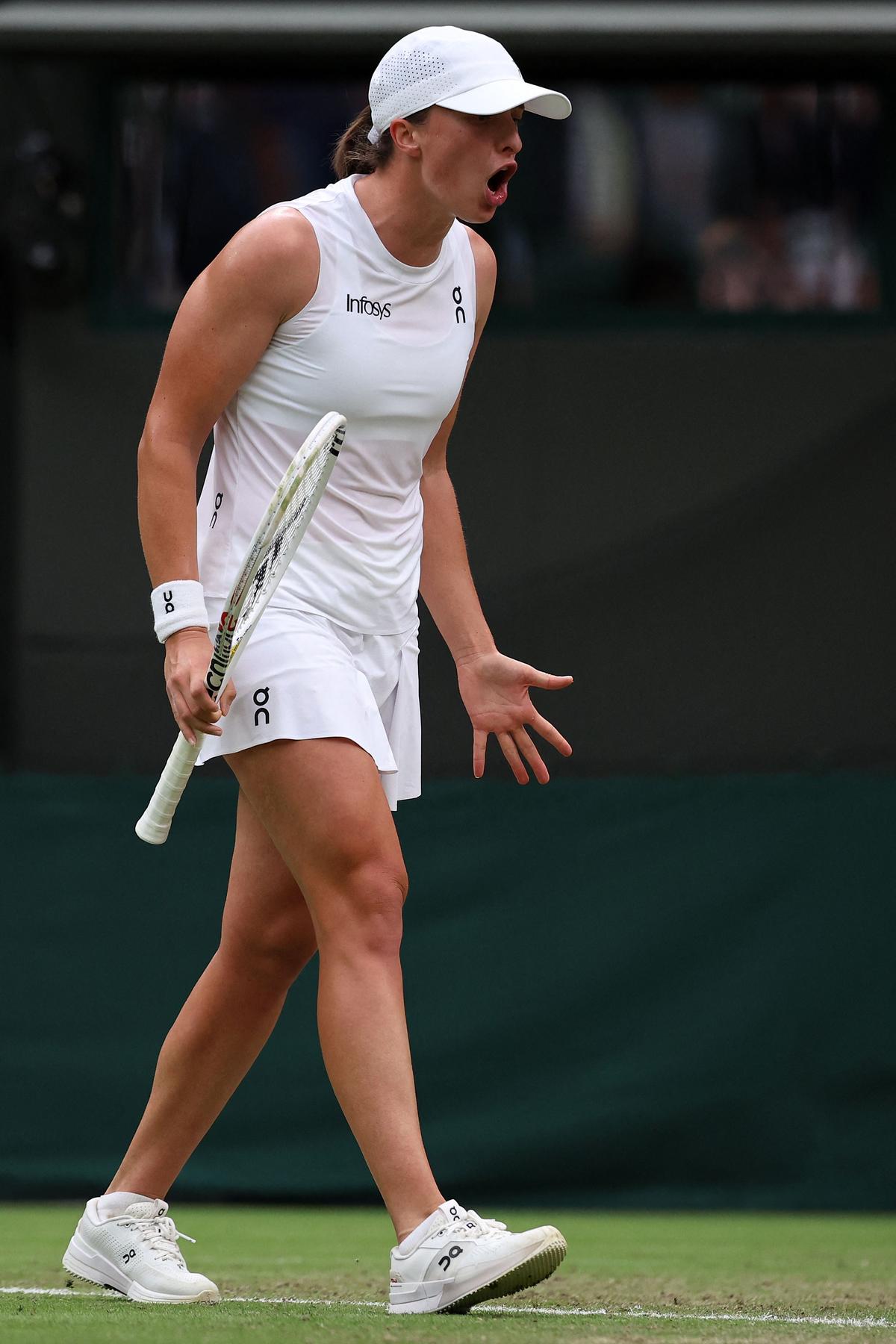
Come crashing down: No. 1 seed Iga Swiatek suffered an early-round upset at the Wimbledon.
| Photo Credit:
AFP
Come crashing down: No. 1 seed Iga Swiatek suffered an early-round upset at the Wimbledon.
| Photo Credit:
AFP
Even though No. 1 seed Iga Swiatek, No. 5 Jessica Pegula, No. 6 Vondrousova, and No. 10 Jabeur suffered early-round upsets in her half of the draw, Krejcikova still faced formidable foes. She edged Veronika Kudermetova, a hard-hitting Russian, 7-6, 6-7, 7-5 in the opening round, the always-dangerous, No. 11 Danielle Collins 7-5, 6-3 in the fourth round, the go-for-broke, No. 13 Jelena Ostapenko 6-4, 7-6 in the quarters, and Rybakina — whom many pundits picked to win the tournament — in the semis.
Paolini benefited from a much easier road to the final, her sternest test coming against No. 12 Madison Keys in the fourth round. Keys served for the match at 5-2 and again at 5-4 but was limping after a physio taped her left thigh. At 5-5, 15-all, and crying from the pain, she had to retire with a pulled hamstring muscle. The empathetic Paolini told the crowd, “Right now I’m so sorry for her. I’m happy [I won] but sad for her.” When interviewer Annabel Croft told the popular Paolini, “You’ve become a bit of a crowd favorite,” the Italian remained modest. “Yeah, I hope so,” as spectators cheered.
Krejcikova, who had won just seven matches all year before Wimbledon, equaled that total during the fortnight. To accomplish that, she played an Open Era record 175 games.
Her exciting 6-2, 2-6, 6-4 triumph over the tenacious Paolini made Krejcikova the fourth woman from the Czech Republic to capture Wimbledon in the Open Era. She followed the late Jana Novotna, her friend and mentor, in 1998, Petra Kvitova in 2011 and 2014, and Vondrousova (right) last year.
During the trophy ceremony, the smiling Paolini saw the bright side of her bittersweet loss. “It’s a dream come true to play on this stage. You played such beautiful tennis. Congrats to you and your team.”
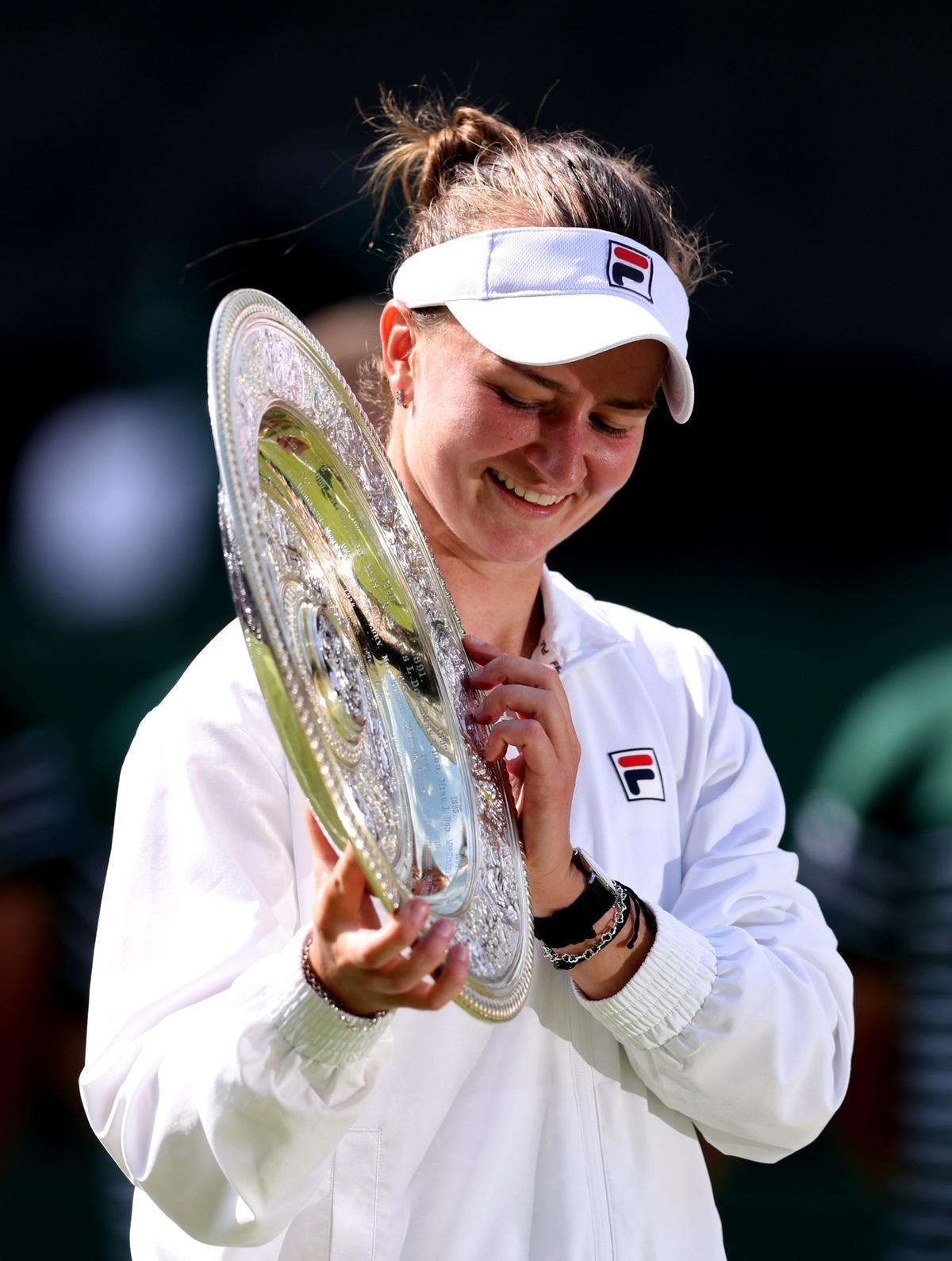
A beaming Krejcikova with the Wimbledon trophy.
| Photo Credit:
Getty Images
A beaming Krejcikova with the Wimbledon trophy.
| Photo Credit:
Getty Images
Krejcikova told the Centre Court spectators, “It’s unbelievable what just happened. It’s the best day of my tennis career and the best day of my life.”
As Barbora did when she won her first major at the 2021 French Open, she recounted the inspiring story of how Novotna — who tragically died at 49 of ovarian cancer in 2017 — became her coach and confidante during her last three years.
“Coming to Jana, knocking on her door, giving her the letter… everything that happened during that moment just changed my life,” Krejcikova said. “It definitely changed my tennis life. During the period when I finished juniors, I didn’t know what I should do. I didn’t know if I should play pro or go the way of education. Jana was the one who told me I had the potential and that I should definitely turn pro and try to make it. Before she passed away, she told me to go and win a Slam.”
Jana’s teenage protégé has achieved that twice. And as Krejcikova poignantly said after her semifinal win, “I have so many beautiful memories and when I step on the court here, I’m just fighting for every single ball because I’m sure that’s what she would want me to do. I miss her so much.”
Source Agencies

